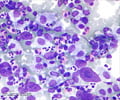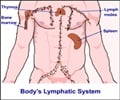Diseases and Chemotherapy Drugs
Malignancies are treated by using combinations of chemotherapy drugs to make the treatment more effective and lessen the side-effects.
The year 1965, was the year of a major break through when James Holland,Emil Freireich and Emil Frei recommended that a combination of drugs should be employed for cancer treatment.
Cancer cells mutate with time and develop resistance to a single drug.However if a combination of drugs is used, each with a different function,it becomes increasingly dificult for the maligant cells to develop resistance towards them.An attempt has been made to list some diseases and the drug combinations that are used to treat them.
- Leukemia
- Standard induction therapy for Acute Lymphoid Leukemia (ALL) typically involves drugs such as Vincristine, Prednisone, Anthracycline, Cyclophosphamide and L-asparaginase.
Intrathecal Therapy involves drugs like methotrexate, which is delivered through spinal taps, and drugs like hydrocortisone (a steroid) and cytarabine (ara-C) .The latter are particularly employed in the treatment of high-risk children.
Children with average-risk ALL are usually treated with Methotrexate, - 6-Mercaptopurine, 6-Thioguanine, Vincristine, Prednisone.
Children with high- risk leukemia are treated differently. They may receive extra drugs such L-asparaginase, Doxorubicin (Adriamycin, Etoposide, Cyclophosphamide, Cytarabine, Dexamethasone. (substituted for prednisone).
In adults, methotrexate, anthracycline, podophyllotoxins and HD cytarabine are employed in consolidation therapy. The drug used during Maintenance Therapy includes Methotrexate, Vincristine and Prednisone. - Standard induction treatment for Acute Myeloid leukemia (AML) includes two drugs - An anthracycline (such as daunorubicin or idarubicin) in combination with cytosine arabinoside, a nucleoside analogue.
- Chronic Myeloid Leukemia (CML) treatment involves medications like kinase inhibitors, interferon alpha and other cancer -curing drugs, such as hydroxyurea.
The Chronic phase of CML is treated with tyrosinase kinase inhibitors. The first of these inhibitors was Imatinib mesylate. Another new drug, Dasatinib, inhibits a wider spectrum of tyrosine kinases. The FDA approved this drug in June 2006 to be used for CML patients who were no longer able to respond or tolerate Imatinib.
- Chronic Lymphoblastic Leukemia (CLL) treatment employs Corticosteroids, purine analogs, anti-tumor antibiotics, monoclonal antibodies, growth factors and cytokines.
- Standard induction therapy for Acute Lymphoid Leukemia (ALL) typically involves drugs such as Vincristine, Prednisone, Anthracycline, Cyclophosphamide and L-asparaginase.
- Lymphomas
- Slow-Growing Non Hodgkins Lymphomas are treated with drugs like fludarabine phosphate, cladribine, Chlorambucil or cyclophosphamide.
- Fast-Growing Non Hodgkins Lymphomas in stage 1 or 2 is treated with an aggressive combination of the following drugs:
- CHOP- Cyclophosphamide, Hydroxydaunomycin, Oncovin, Pednisone;
- BACOD- Bleomycin, Adriamycin, Cyclophosphamide, Oncovin, Dexamethasone;
- MACOP - B-Methotrexate, Adriamycin, Cyclophosphamide, Oncovin, Prednisone, Bleomycin;
- Pro-MACE-CytaBOM - Prednisone, Methotrexate, Adriamycin, Cyclophosphamide, Etoposide, Cytarabine, Bleomycin, Oncovin
- EPOCH- Etoposide, Prednisone, Oncovin, Cyclophosphamide, Halotestin.
- The mainstay for Hodgkins Lymphoma chemotherapy is as follows-
ABVD (abbreviation for Adriamycin, Bleomycin, Vinblastine and Decarbazine) is the most effective treatment for Hodgkins disease. This treatment took shape in Italy in the 1970s and normally takes between 6-8 months to be effective. Longer protocols may sometimes be a necessity.
- Slow-Growing Non Hodgkins Lymphomas are treated with drugs like fludarabine phosphate, cladribine, Chlorambucil or cyclophosphamide.
- Colorectal cancer is treated with a combination of drugs such as Fluorouracil (5-FU), leucovorin, oxaliplatin, capecitabine and irinotecan.
- Cervical cancer treatment employs regimens including drugs such as Cisplatin, Carboplatin, 5-FU, Hydroxyurea, Ifosfamide, Paclitaxel , and Cyclophosphamide
Brand Name of the Drug and Cancer Indicated
| Imatinib mesylate (Gleevec) | Chronic myelogenous leukemia and gastrointestinal stromal tumor |
| Bexarotene (Targretin) | Cutaneous T cell lymphoma |
| Altretamine (Hexalen) | Epithelial ovarian cancer |
| Thalidomide (Thalomid) | Multiple myeloma |
| Gefitinib (Iressa) | Non small cell lung cancer |
| Letrozole (Femara) | Stages 2-4 breast cancer |
| Exemestane (Aromasin) | Stages 2-4 breast cancer |
| Anastrozole (Arimidex) | Stages 2-4 breast cancer |
| Tamoxifen (Nolvadex) | Stage 2-4 breast cancer |
| Toremifene (Fareston) | Stages 2-4 breast cancer |
| Mesna (Mesnex) | For people receiving ifosfamide |












